Why it is essential to combat ocean plastic pollution in developing countries
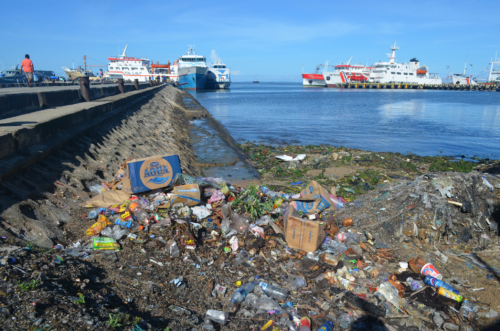
By: Clare Romanik, Senior Urban and Ocean Plastics Specialist, USAID
Ocean plastic pollution has reached a crisis level. Every minute, the equivalent of an entire garbage truck of plastic makes its way into the world’s oceans—roughly eight million tons annually. The majority of plastic ocean debris comes from mismanaged waste in cities along coasts and rivers in the developing world. Their waste management systems, infrastructure, and governments struggle to keep pace with increasing amounts of trash from rapidly growing urban populations.
Stopping ocean plastic pollution at the source is the most effective way to address this challenge.
Fast growing cities = increasing plastic waste
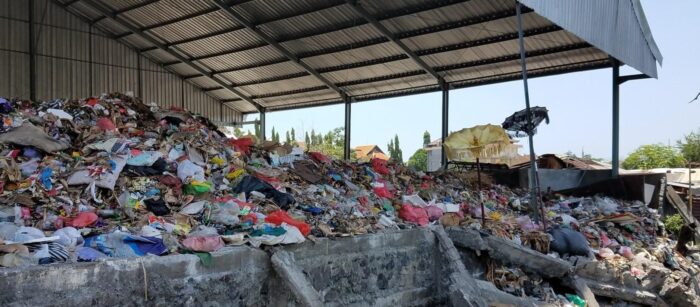
Unprecedented rates of urbanization in the developing world[1] are placing tremendous pressure on cities to deliver municipal services and manage environmental challenges. According to the World Bank, by 2050 the world is expected to increase its generation of municipal solid waste by 70 percent. Waste generated in low-income countries is expected to triple by 2050.
We know that the share of waste that is inorganic – and specifically plastic – increases with rising incomes. So not only will the developing world produce much more waste, but much more of it will be plastic. One result of this rapid growth in waste generation is that at least one-third of solid waste worldwide is not managed properly; in low-income countries 90 percent of waste is openly dumped or burned. (World Bank)
When solid waste is not regularly collected, households and
businesses often dump it in the natural environment, usually in rivers or
canals, making the problem ‘go away.’
Even when waste is collected, there are many opportunities for leakage
because waste transfer stations, recycling facilities, dumps, or landfills are
often inappropriately located along waterways or coastal areas – and the
infrastructure is deteriorating without proper maintenance.
USAID programs to prevent ocean plastic pollution
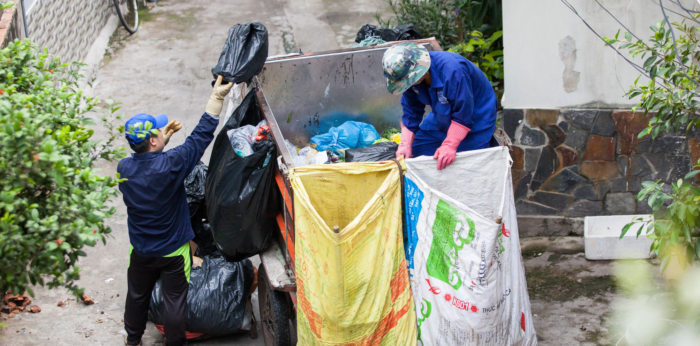
More than 3.5 million people have directly benefited from USAID’s programs to improve solid waste management and recycling.
Preventing and reducing ocean plastic pollution will not be achieved without fixing the systems underlying waste generation, management, and recycling. Recognizing this, USAID takes a comprehensive systems approach. To create systemic change, USAID focuses on strengthening local actors (governments, businesses, civil society organizations, and individuals) and their collaboration so that they become more self-reliant. USAID’s engagement is context-specific based on each country’s or city’s capacity and commitment to combat ocean plastic pollution.
Our flagship program for addressing this issue is Clean Cities, Blue Ocean, a $48 million global program launched last year. In addition to providing grants to local organizations for fostering social behavior change and building local capacity for solid waste management and recycling, Clean Cities, Blue Ocean is providing specialized technical expertise to enable private sector investment in infrastructure, greater transparency, and improved local enforcement of regulations.
In addition, USAID launched the Municipal Waste Recycling Program in 2016, providing grants to 30 locally-led projects with innovative, sustainable solutions in Indonesia, Philippines, Sri Lanka, and Vietnam – four countries which are among the largest contributors to ocean plastic pollution.
While tackling a problem the size of an ocean may seem overwhelming, USAID is taking action and seeing results. Here are some highlights from the past couple of years to today.
Engaging the private sector on the 3Rs (reduce, reuse, recycle) globally and locally
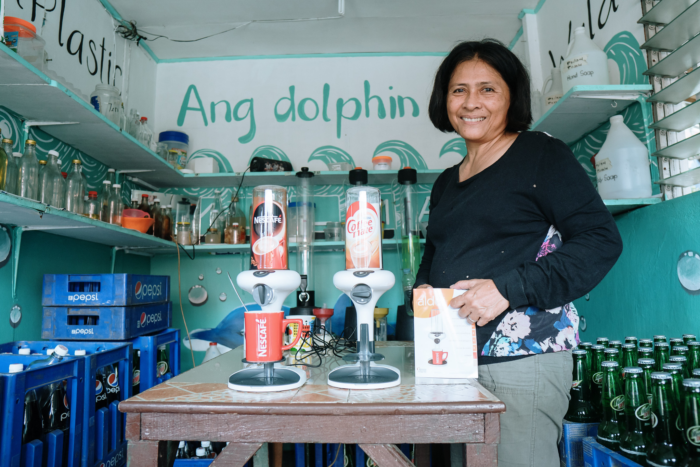
In 2019 USAID signed an agreement leveraging more than $100 million in a private-sector investment strategy managed by Circulate Capital, a firm dedicated to incubating and financing companies and infrastructure that prevent ocean plastic pollution in South and Southeast Asia. The blended finance partnership is backed by multinational corporations, including PepsiCo, Procter & Gamble, Dow, Danone, Unilever, and Coca-Cola.
We also connect private sector companies with USAID grantees working to increase the safety, ease, and value of recycling and preventing ocean plastic pollution. For example, in Indonesia, a partnership with Danone and H&M guarantees the purchase price of plastic materials collected by a USAID grantee on the Thousand Islands. In Sri Lanka, the local company Eco-Spindles purchases recyclable plastic bottles from materials recovery facilities supported by USAID grantees, including through bins provided by Coca Cola. In the Philippines, Nestle partnered with a USAID grantee to launch a Nestle Aldo Dispenser for coffee and creamer at a “Wala Usik” (nothing is wasted) convenience store on Negros Island. The zero-waste store allows customers to purchase items from bulk dispensers into refillable containers rather than single-use plastic sachets that do not have a recycling market.
Changing policies and behaviors around waste management
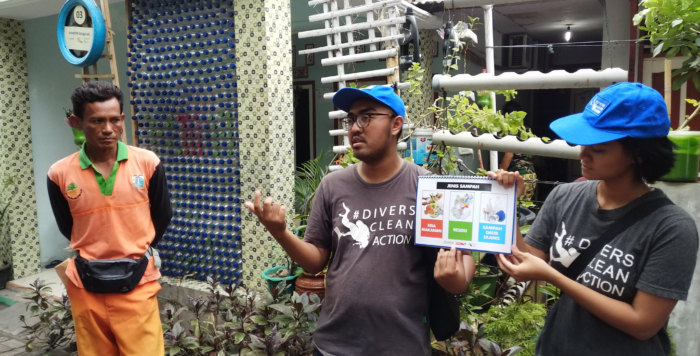
Independent waste collectors are often the backbone of waste collection systems in low and middle-income countries. By empowering cooperatives of waste collectors and encouraging contractual relationships with the local government, a USAID grantee working in Ho Chi Minh City, Vietnam has created a win-win scenario that improves waste collection and the livelihoods of waste collectors. The strengthened cooperatives support waste collectors with safe workwear, health insurance, and training on occupational safety, first-aid, communicable disease prevention, and gender equality. In turn, the city is able to have more reliable services, increase waste collection and ensure that hard-to-reach neighborhoods are serviced.
Women’s and youth organizations and schools are key partners for creating behavior change to increase household segregation of waste and recycling. USAID grantees have provided training to more than 30,000 women and thousands of waste collectors and engaged 90,000 youth in its efforts to combat marine debris.
In the traditionally male-dominated solid waste management and recycling sector, prevailing social norms limit women’s ability to move into decision-making and leadership positions. Women also struggle to access financing to purchase equipment and start and grow recycling businesses. USAID projects provide seed funds and training for women entrepreneurs to establish and grow their recycling business. As a result, more than 300 women have obtained non-traditional jobs in the sector.
Supporting locally appropriate technology and innovation
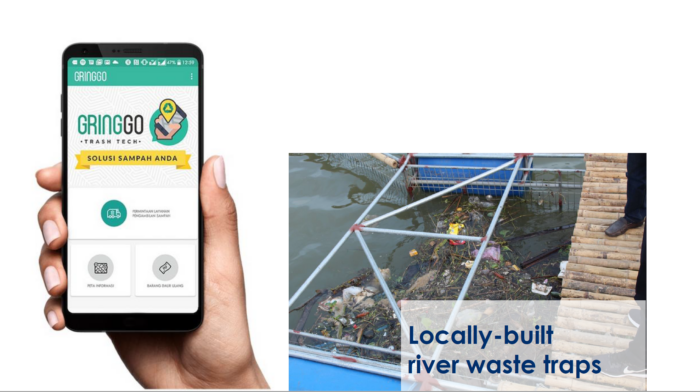
USAID supports the development and application of appropriate technologies for developing countries. In Indonesia, for example, a USAID grantee is engaging hundreds of youth volunteers in collecting geospatial data that is being used to improve the efficiency of waste collection routes, resulting in higher waste collection and recycling volumes. This innovative use of technology to solve an urgent problem has also attracted the attention of Google, which recently selected the USAID grantee to receive additional grant funding and technical support as part of Google’s Impact Challenge. Other technology we have supported include a river waste trap for catching debris, safe equipment for upcycling post-consumer plastic, applications for finding water refilling stations in tourist areas, and low-cost and efficient waste collection vehicles.
Increasing regional and South-South cooperation
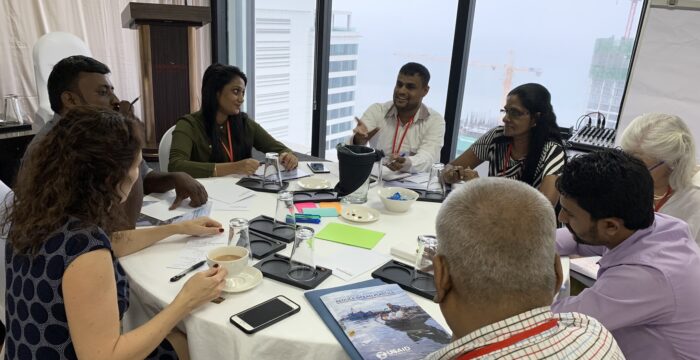
USAID also facilitates the sharing of lessons learned among local organizations within individual target countries and throughout the Asian region by participating in global and regional platforms such as the annual Our Ocean Conference and the Asia Pacific Economic Cooperation (APEC). A strength of USAID’s new Clean Cities, Blue Ocean program is integration—the ability to work across regions to bring lessons learned from country to country and region to region—including through South-South cooperation, as well as to ensure that lessons learned from local actions are reflected in national policies.
To learn more about USAID’s work on ocean plastics, visit www.urban-links.org/ocean-plastics
References
- Kaza, Silpa; Yao, Lisa C.; Bhada-Tata, Perinaz; Van Woerden, Frank. 2018. What a Waste 2.0: A Global Snapshot of Solid Waste Management to 2050. Urban Development. Washington, DC: World Bank. © World Bank. https://openknowledge.worldbank.org/handle/10986/30317 License: CC BY 3.0 IGO.”
- USAID. 2013. Sustainable Service Delivery in an Increasingly Urbanized World. USAID Policy. Washington, DC: USAID.
- USAID. 2018. Annual Program Statement for the Municipal Waste Recycling Program (MWRP) to Reduce Plastics Pollution of the Oceans – Indonesia, Philippines, Sri Lanka, and Vietnam. USAID’s Municipal Waste Recycling Program. Washington, DC: USAID
- www.urban-links.org/ocean-plastics (USAID website on ocean plastics)
- www.urban-links.org/mwrp (USAID website on Municipal Waste Recycling Program
- UN DESA. 2014. World Urbanization Prospects. UN DESA.
[1] Continuing population growth and urbanization are projected to add 2.5 billion people to the world’s urban population by 2050, with nearly 90 percent of the increase concentrated in Asia and Africa. World Urbanization Prospects. UN DESA 2014.

